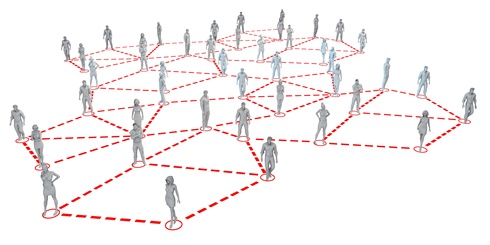It’s been said that the first 100 days in a new executive role are the hardest. But what about the days after that?
You’ve built your team, aligned with the company goals and you’re finally ready to knuckle down, roll up your sleeves and get to work. After all, you want to show everyone that they made a good choice when they promoted you to your new role.
Once the crucial first 100 days have passed, it’s time to broaden your focus and start building (or adding to) your professional network.
Yes, that’s right, you need to focus on networking. This is more than simply adding cards to a rolodex or clicking “add connection” on LinkedIn. This is building strategic partnerships inside and outside your organization.
Everyone talks about the value of networking, and yet it’s one of those activities that’s never urgent and is easy to put off. Easy to put off until you realize you need to collaborate with an executive from another branch or department – and they won’t return your phone call because they have no idea who you are.
5-Step Strategic Networking Strategy
Luckily there’s an easy, five-step strategy for building relationships. It’s simple but requires discipline and accountability.
- Make a list of all the people and executives who you need to know (and who don’t know you). For example, department heads, branch heads, VPs, or Directors. Also, the next time you’re in a meeting, look around the room and make a note of whom you’d like to get to know better. Being in a meeting together is a natural interpersonal ecosystem for building relationships.
- Reach out to the people on your list. Ask if you could buy them a cup of coffee and spend 15-30 minutes learning about what they do for the company.
- Sit down and have a conversation with them. Find out what challenges they’re facing and think about ways you can be of benefit to them.
- Find opportunities to stay in touch. This is arguably the most difficult, and critical, step to the relationship building strategy. Some part of you should always be thinking about your contacts and keeping mental notes when you come across information that might be helpful to them.
- Hold yourself accountable. If you’re not disciplined and methodical, it will be easy for you to put off networking. Set a weekly goal for yourself like “I’m going to meet one new executive in a different function within the company.” Put it in your calendar and ask your assistant to remind you until the meeting with the executive is on your calendar.
Just as important as accountability is keeping notes about your contact, their interests, their professional goals, and ideas to keep yourself top-of-mind. It can be as simple as using a spreadsheet or an online relationship manager.
Networking and strategic relationship building are fundamental to success. Take for example a complaint from peers about a derailing executive: “I don’t really know him/her, they never talk to me.” Spend time educating others about yourself as a person. Sharing interests or hobbies does not violate the sacred boundary between your work and personal life.
Add to that the research that says peer endorsement helps an executive get promoted and you have a pretty powerful argument in favor of networking.
Some Things to Keep In Mind About Networking
You’re going to feel like networking isn’t a valuable use of your time. That’s ok! Networking like many other skills, is a muscle that needs to be strengthened. The more you use it, the stronger (and easier) it gets.
When people don’t know you, you’re like a blank screen. They’ll project what they think they know – and it’s usually negative. That’s just human nature. But once they come to know you, they find that’s not the truth.
You can overcome a bad first impression. First impressions are often a reflection of what a person is feeling at that moment. If someone is having a bad day, it’s likely that a first impression will be negative. However, you can change how others feel about you. Invest time and energy to help them reach their goals. The investment will be worth it.
Remember the purpose of building relationships is not to create lifelong friendships. It’s about collaborating and working together towards a common goal.
And finally, don’t forget you have a lot to offer others. While you will certainly benefit from learning about others, they can benefit from your knowledge and experience at the same time.
Building Relationships is a Marathon, Not a Sprint
We spend a lot of time sitting behind a computer screen, which makes it’s easy to click a link to add someone to our online networks. But an online connection is just a number on a screen. What does it really do? Unless you bring the relationship into the real world, you’re not going to transform that connection into a relationship.
Taking the time, making the effort to network might not have immediate results. But don’t give up! Stick with it. Hold yourself accountable to relationship-building goals and over time you’ll reap the benefit. Keep making deposits into the relationship bank and someday, when you need it, you’ll have enough capital “in the bank account of the relationship” from which to draw.

